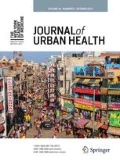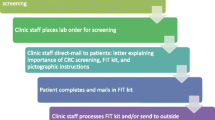Abstract
African Americans (AAs) have the highest incidence rates of colorectal cancer (CRC) among all races in the US. These disparities may be attributed to lower participation in CRC prevention and control activities [e.g., flexible sigmoidoscopy (FS), fecal occult blood testing (FOBT)]. This is a current issue in East Harlem where less than half the residents in this area participate in CRC screening and mortality rates due to CRC are higher than the national average. We examined correlates of FS and FOBT screening among AAs based on the transtheoretical model (TTM) of behavior change. One hundred and eleven AA men and women, 50 years and older (51–92), low-income, and at average risk for CRC were recruited at an ambulatory care center in East Harlem. Assessments focused on sociodemographic, medical, psychosocial and TTM variables. The first logistic regression model showed that higher levels of education (p < 0.05), greater knowledge of FS (p < 0.05), and greater endorsements of Thinking Beyond Oneself (p < 0.05) were associated with adherence to FS screening guidelines. The second model showed that only greater knowledge of FOBT (p < 0.05) and receiving a physician’s recommendation (p < 0.01) were significant correlates of adherence to FOBT screening guidelines. This study supported the application of components of the TTM for FS and FOBT screening among low-income AAs receiving care in an urban medical center and illustrated the need for interventions targeting both patients and their providers.

Similar content being viewed by others
References
American Cancer Society. Cancer Facts and Figures for African Americans 2005–2006. Atlanta, Georgia: American Cancer Society; 2005.
Ries LAG, Eisner MP, Kosary CL, Hankey BF, Miller BA. SEER Cancer Statistics Review, 1975–2000. Bethesda, Maryland: NCI. Accessed on November 2005. Available at http://seer.cancer.gov/csr/1975_200.
Ries L, Eisner M, Kosary C. SEER Cancer Statistics Review, 1973–1999. Bethesda, Maryland: National Cancer Institute; 2002.
CDC. Trends in screening for colorectal cancer—United States, 1997 and 1999. MMWR. 2001;50:162–166.
Seeff LC, Nadel MR, Klabunde C, et al. Patterns and predictors of colorectal cancer test use in the adult U.S. population. Cancer. 2004;100(10):2093–2103.
Cooper GS, Yuan Z, Rimm AA. Racial disparity in the incidence and case-fatality of colorectal cancer: analysis of 329 United States counties. Cancer Epidemiol Biomark Prev. 1997;6(4):283–285.
Center for Disease Control and Prevention. National Health Interview Survey Public Data Use File 2000. National Center for Health Statistics.
Polite BN, Dignam JJ, Olopade OI. Colorectal cancer model of health disparities: understanding mortality differences in minority populations. J Clin Oncol. 2006;24(14):2179–2187, May 10.
Ries LAG, Eisner MP, Kosary CL, et al. SEER Cancer Statistics Review, 1975–2002. Bethesda, Maryland: National Cancer Institute; 2005.
James AS, Campbell MK, Hudson MA. Perceived barriers and benefits to colon cancer screening among African Americans in North Carolina: how does perception relate to screening behavior? Cancer Epidemiol Biomark Prev. 2002;11(6):529–534, June.
American Cancer Society. Colorectal Cancer Facts and Figures Special Edition, 2005. Atlanta: American Cancer Society, Inc.; 2005.
Cancer Incidence and Mortality by Race and Region, 1999–2003. New York State. Department of Health, New York State Cancer Registry. Available at: http://www.health.state.ny.us/statistics/cancer/registry/table4/tb4whitenys.htm. Accessed February 13, 2006.
Cancer Incidence and Mortality by NYC Neighborhood, 1999–2003. New York State. Department of Health, New York State Cancer Registry. Available at http://www.health.state.ny.us/statistics/cancer/registry/vol1/v1neastharlem.htm. Accessed February 13, 2003.
American Cancer Society. Colorectal Cancer Facts and Figures Special Edition 2005. Atlanta, Georgia: American Cancer Society; 2005.
Friedman L, Webb J, Everett T. Psychosocial and medical predictors of colorectal cancer screening among low-income medical outpatients. J Cancer Educ. 2004;19(3):180–186.
Gilbert A, Kanarek N. Colorectal cancer screening: physician recommendation is influential advice to Marylanders. Prev Med. 2005;41(2):367–379.
West C. Race Matters. Boston, Massachusetts: Beacon; 1993.
Powe BD. Cancer fatalism among elderly African Americans: effects on colorectal cancer screening. Cancer Nurs. 1995;18:385–392.
Greiner KA, Born W, Nollen N, Ahluwalia JS. Knowledge and perceptions of colorectal cancer screening among urban African Americans. J Gen Intern Med. 2005;20(11):977–983.
Dettenborn L, DuHamel K, Butts G, Thompson H, Jandorf L. Cancer fatalism and its demographic correlates among African American and Hispanic women: effects on adherence to cancer screening. J Psychosoc Oncol. 2004;22(4):47–60.
Janz NK, Becker MH. The health belief model: a decade later. Health Educ Q. 1984;11:1–47.
Prochaska JO, DiClemente CC. Stages and processes of self-change in smoking: toward an integrative model of change. J Consult Clin Psychol. 1983;5:390–395.
Green PM, Kelly BA. Colorectal cancer knowledge, perceptions, and behaviors in African Americans. Cancer Nurs. 2004;27(3):206–215.
Brenes GS, Paskett ED. Predictors of stage of adoption for colorectal cancer screening. Prev Med. 2000;31(4):410–416.
Trauth JM, Ling BS, Weissfeld JL, Schoen RE, Hayran M. Using the transtheoretical model to stage screening behavior for colorectal cancer screening. Health Educ Behav. 2003;30(3):322–336.
Manne S, Markowitz A, Winawer S, et al. Correlates of colorectal cancer screening compliance and stage of adoption among siblings of individuals with early onset colorectal cancer. Health Psychol. 2002;21(1):3–15.
Walsh JM, Terdiman JP. Colorectal cancer screening: clinical applications. JAMA. 2003;289:1297–1302.
Winawer SJ, Schottenfeld D, Flehinger BJ. Colorectal cancer screening. J Natl Cancer Inst. 1991;83:243–253.
Myers RE, Ross E, Jepson C, et al. Modeling adherence to colorectal cancer screening. Prev Med. 1994;23:142–151.
Myers RE, Trock BJ, Lerman C, Wolf R, Ross E, Engstrom PF. Adherence to colorectal cancer screening in an HMO population. Prev Med. 1990;19:502–514.
Myers RE, Wolf TA, McKee L, et al. Factors associated with intention to undergo annual prostrate cancer screening among African American men in Philadelphia. Cancer. 1996;78:471–479.
Rakowski W, Ehrich B, Dube CE. Screening mammography and constructs from the transtheoretical model: associations using two definitions of stage of adoption. Annals Behav Med. 1996;18(2):91–100.
Robb KA, Miles A, Wardle J. Subjective and objective risk of colorectal cancer (UK). Cancer Causes Control. 2004;15:21–25.
Horner RD, Salazar W, Geiger HJ, et al. Changing healthcare professionals’ behaviors to eliminate disparities in healthcare: what do we know? How might we proceed? Am J Manag Care. 2004;SP12–SP19, September.
Iuannou GN, Chapko MK, Dominitz JA. Predictors of colorectal cancer screening participation in the United States. Am J Gastroenterol. 2003;98:2082–2090.
Acknowledgments
This project was funded by Grant No. NIH-CA84809 from the National Institutes of Health. The writing of this paper was supported by Grant No. NCI-CA81137-05 from the National Cancer Institute. The authors would like to extend thanks to Gary Winkel, Ph.D. for his statistical guidance throughout this study and Justin Michener, M.A. for his assistance with data management.
Author information
Authors and Affiliations
Corresponding author
Additional information
Lawsin, DuHamel, and Jandorf are with the Department of Oncological Sciences, Mount Sinai School of Medicine, New York, NY, USA; Weiss is with the Department of Medicine, Mount Sinai School of Medicine, New York, NY, USA; Rakowski is with the Department of Community Health, Brown University, Providence, RI, USA.
Rights and permissions
About this article
Cite this article
Lawsin, C., DuHamel, K., Weiss, A. et al. Colorectal Cancer Screening among Low-Income African Americans in East Harlem: A Theoretical Approach to Understanding Barriers and Promoters to Screening. J Urban Health 84, 32–44 (2007). https://doi.org/10.1007/s11524-006-9126-6
Published:
Issue Date:
DOI: https://doi.org/10.1007/s11524-006-9126-6



